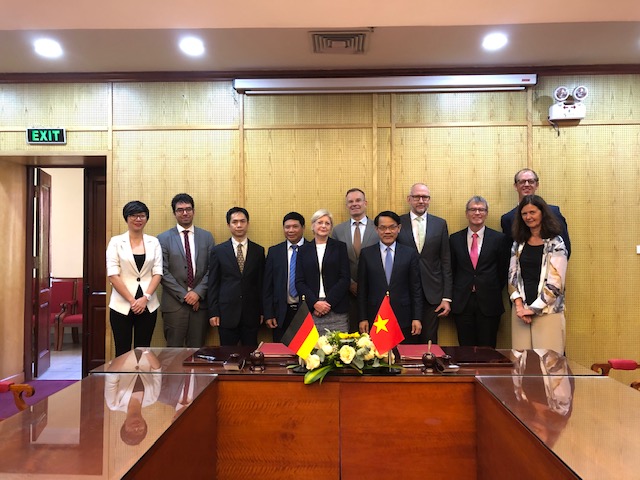Germany has committed itself to providing more than 213 million euros (US$236.3 million) for Vietnam’s growth strategy in energy, coastal protection, vocational training, and others over the next two years.
Germany and Vietnam decided on October 29 and 30 to develop their cooperation in the future topics of vocational training, energy and the environment in their development policy negotiations in Hanoi, the German Embassy said in a press release on Monday.
With commitments amounting to 213.4 million euros, the Federal Ministry for Economic Cooperation and Development (BMZ) is supporting Vietnam for the next two years in making the Southeast Asian country’s growth strategy more environmentally and socially compatible.
The focus of the collaboration is primarily on efficient energy supply, marketability of renewable energy, coastal protection through reforestation of mangrove forests in the Mekong Delta and sustainable forest management in north and central Vietnam.
In addition, both sides agreed to support the sustainability of rice cultivation in the Mekong Delta as part of the ‘Green Innovation Center’ initiative.
For example, small farms in the Mekong Delta region benefit from sustainable integration in value chains.
In vocational education, both countries want to mobilize Vietnamese and German companies to offer apprenticeships for young Vietnamese across the Southeast Asian country.
The German Federal Ministry for the Environment, Nature Conservation and Nuclear Safety (BMU) has awarded a further 30 million euros ($33.2 million) for the next round of funding of the International Climate Initiative, which promotes biodiversity and climate projects in Vietnam.
In addition, the BMU is providing almost 11 million euros ($12.2 million) for a project to reduce the plastic waste collection in the Mekong River.
By 2020, both countries will be able to look back on 45 years of successful Vietnamese-German diplomatic cooperation.
A milestone in this cooperation is the ‘Strategic Partnership’ agreed between the two countries in 2011, in which development cooperation plays a key role.
This year's intergovernmental negotiations took place at an important time: the Vietnamese government is currently defining its economic and social objectives for the next decade as part of a new 10-year socio-economic development strategy.
At the same time, the German government is comprehensively reforming its development strategies to better respond to changing realities in partner countries and to make their contribution to the implementation of the international agenda, in particular the implementation of the 2030 Agenda and the Paris Climate Goals, even more effective.
Like us on Facebook or follow us on Twitter to get the latest news about Vietnam!



















































